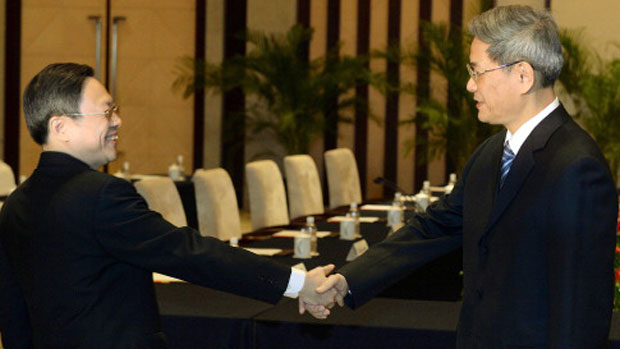Will China-Taiwan summit lift distant threat of war?
Ministers from Beijing and Taipei are holding the highest-level talks in 65 years

A free daily email with the biggest news stories of the day – and the best features from TheWeek.com
You are now subscribed
Your newsletter sign-up was successful
CHINA and Taiwan have begun their first government-to-government talks since the end of the Chinese civil war in 1949.
Wang Yu-chi, of Taiwan's Mainland Affairs Council, and Zhang Zhijun, his Chinese counterpart, are meeting in the eastern Chinese city of Nanjing.
Wang said his aim was "to promote mutual understanding between the two sides".
The Week
Escape your echo chamber. Get the facts behind the news, plus analysis from multiple perspectives.

Sign up for The Week's Free Newsletters
From our morning news briefing to a weekly Good News Newsletter, get the best of The Week delivered directly to your inbox.
From our morning news briefing to a weekly Good News Newsletter, get the best of The Week delivered directly to your inbox.
China will also press Taiwan to pass a trade deal, widely seen as the most significant agreement between the two sides in 65 years. A bill to finalise the deal has stalled in the Taiwanese parliament.
Why have official talks taken so long?
The Chinese civil war, a brutal conflict in the first half of the 20th century, cost millions of lives. After years of fighting, Mao Zedong's communist forces overwhelmed supporters loyal to the nationalist leader, Chiang Kai-shek, forcing more than two million people to flee to the neighbouring island of Taiwan. The Taiwanese government has never renounced its claims over mainland China, officially referring to itself as the Republic of China.
China still hopes for a reunification with Taiwan, and has offered a solution similar to the "one-country, two-systems" model it has with Hong Kong. But the communist government still regards Taiwan as a rebel region that will be reunified by force if necessary.
A free daily email with the biggest news stories of the day – and the best features from TheWeek.com
Throughout the 1990s, dialogue between the two sides was conducted through quasi-official organisations, but this week's meeting will be the highest-level talks ever held.
What does each side want?
Taiwan will propose permanent representatives in each territory, the BBC reports, and will push for the establishment of official press freedoms. China has previously refused accreditation to several Taiwanese media outlets.
"Press freedom is a universal value... We've repeatedly said that the most important thing regarding news exchange between the two sides is the free and equal flow of information," Taiwan's Mainland Affairs Council said in a statement.
Taiwan will also push for greater security assurances from the mainland government.
Beijing, meanwhile, wants greater economic collaboration between the two territories. The proposed Economic Co-operation Framework Agreement (ECFA) aims to reduce taxes on 539 Taiwanese exports to China and a further 267 Chinese products sold to Taiwan. Trade is important to both sides, with over $110bn (£73bn) exchanged every year.
But with no official agenda, the talks are largely seen as an exercise in bridge-building that will make way for greater reconciliation in the future.
Will the talks achieve anything?
Beijing maintains its claim that Taiwan is part of its territory and any Taiwanese efforts to declare formal independence or delay to reunification will result in immediate attack.
Wang said that the meeting was "not easy" and that the two sides would definitively not be signing any agreements during the four-day visit.